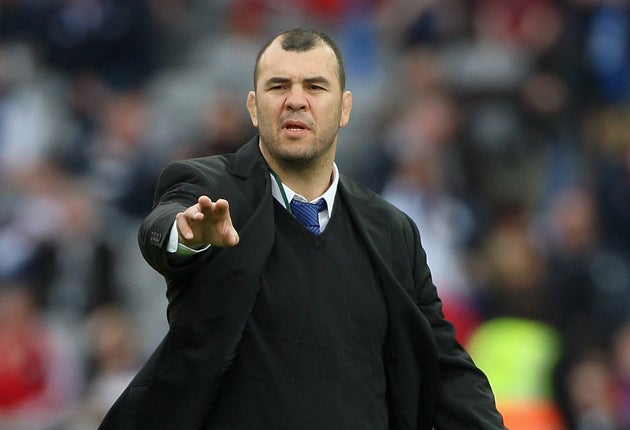Brian Ashton: England's hopes depend on clubs raising their games

Followers of English club rugby may feel disappointed, even alarmed, at the way the European campaign has unfolded, but there is no denying that this weekend's two-nation contest in the Heineken Cup is a fair and accurate reflection of the way things are at the top end of the northern hemisphere game.
France and Ireland, Ireland and France. Who, if they are being honest, can dispute that these countries are currently the dominant forces in our corner of the union world?
They have arrived here from entirely different directions, having taken totally different paths. The leading French teams have large squads, supported by spectacular amounts of money. There are still some clubs who consider the domestic Top 14 tournament to be their major priority, but increasingly, the real powerhouses of the game on the far side of the Channel define themselves by the Heineken Cup, which, as we saw during last month's wonderful quarter-finals weekend, is a very high level indeed.
The Irish, meanwhile, have come at it another way, with the best of their talent signed up on what might be called quasi-central contracts. Their season is specifically geared towards European and international rugby and in player welfare terms they are ahead of the game. The French tend to be reasonably well rested because squad sizes allow coaches the luxury of operating a rotation policy, but there is no substitute for a structured fixture programme of the kind that allows the men of Munster and Leinster to play just the right amount of high-intensity rugby at precisely the right stages of the season.
Last year, Ireland completed a Six Nations Grand Slam. This year, France did likewise. And now, each country has an equal split of the Heineken Cup semi-final action. Does success at international level trickle down into the elite club/provincial game, or is it the other way round? It seems to me that in the case of Ireland, where the Test side is predominantly made up of Munstermen and Leinstermen, a bit of both applies. Call it a virtuous circle.
Not so long ago, Munster were ferocious, entirely forward- oriented and Garryowen-driven. They are ferocious still – ask Northampton, who had the misfortune to visit Thomond Park in the last eight – but with judicious coaching and clever recruitment from south of the Equator, they have developed a more open- minded and open-ended brand of rugby. Leinster are the flipside. Long celebrated for their uninhibited approach to the attacking game, they now have something more concrete about them up front. To descend into the rugby vernacular for a second, they have found themselves some "dog".
I would mention here the contributions of two coaches. Declan Kidney was in charge at Munster before he stepped up to coach the Ireland national side and I'd be very surprised if he wasn't at the very heart of their transformation: indeed, you can see similarities in the way both Munster and Ireland have grown in recent seasons. As for Leinster, it is a sure sign of top-class coaching at work when a side becomes much more difficult to beat while losing nothing of the best of itself in the attacking sense. This is a precise description of Michael Cheika's achievement in Dublin, and when he moves to Stade Français in Paris next season, it may well be that they move forward every bit as rapidly.
This afternoon's Toulouse-Leinster contest has a special air about it. The two sides famously met in a classic quarter-final four years ago, Toulouse spurning the option of sticking the ball up their jumper in favour of playing the Irishmen at their own free-running game. They lost as a result and some people doubtless thought them daft. But for a great club like Toulouse, the challenge is the thing that matters most. To my mind, there is something admirable about players who have the courage to fail.
Biarritz, who meet Munster in tomorrow's tie, do not have a reputation for playing the "beautiful game": when I coached Bath in that same 2006 tournament and we met them in the semi-final, they played not to lose, and didn't. But last month, in their quarter-final with Ospreys, they revealed an adventurous side few of us knew existed and scored some thrilling tries as a result.
It seems to me that this mirrors developments in the international environment, where Marc Lièvremont has restored a sense of ambition to the Test side. His predecessor, Bernard Laporte, seemed intent on doing away with the romantic heart of the French game, or at least concealing it beneath an Anglo-Saxon skin. Now, freedom of expression is back in vogue and, as a consequence, we have two fantastic semi-finals in prospect.
Bath set to finish with bigger splash
I haven't had much to say about my old club Bath over the course of the season, but how could I ignore their outstanding victory over Wasps at Twickenham last weekend? It was great to see them playing with such belief, which manifested itself in their ability to score brilliant tries while their backs were against the wall.
Should they beat Leeds in the last round of league games next weekend, they will have to get their heads around a Premiership semi-final with Leicester at Welford Road. With Butch James and Olly Barkley back in harness in midfield and the South African No 8 Luke Watson proving his worth, it is not beyond the realms of possibility that this game will live up to Heineken Cup standards.
Subscribe to Independent Premium to bookmark this article
Want to bookmark your favourite articles and stories to read or reference later? Start your Independent Premium subscription today.

Join our commenting forum
Join thought-provoking conversations, follow other Independent readers and see their replies